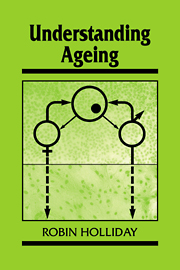Book contents
- Frontmatter
- Contents
- Preface
- Author's note
- Acknowledgements
- 1 Introduction
- 2 The evolved anatomical and physiological design of mammals
- 3 Maintenance of the adult organism
- 4 Theories of ageing
- 5 Cellular ageing
- 6 Genetic programmes for ageing
- 7 The evolution of longevity
- 8 Human disease and ageing
- 9 A better understanding of ageing
- Notes
- References
- Author index
- Subject index
7 - The evolution of longevity
Published online by Cambridge University Press: 31 March 2010
- Frontmatter
- Contents
- Preface
- Author's note
- Acknowledgements
- 1 Introduction
- 2 The evolved anatomical and physiological design of mammals
- 3 Maintenance of the adult organism
- 4 Theories of ageing
- 5 Cellular ageing
- 6 Genetic programmes for ageing
- 7 The evolution of longevity
- 8 Human disease and ageing
- 9 A better understanding of ageing
- Notes
- References
- Author index
- Subject index
Summary
In discussion of the origins and existence of animals that have a soma of finite lifetime, there are two interrelated evolutionary problems. The first is the evolution of ageing itself. As we saw in Chapter 1, this must have occurred very early on in evolutionary history in simple invertebrates. It is also likely that mortal somatic cells and tissues appeared in more than one invertebrate taxonomic group. If this is the case, then any discussion of the evolution of ageing in vertebrates is to some extent misleading, because they were derived from animals that already had a mortal soma. Therefore, discussion of the ‘evolution of ageing’ in higher organisms is really discussion of the evolution of longevity. The second problem is the modulation of longevity. What determines the length of life of mammalian and other species? We know in many cases that evolution resulted in an increase in longevity, and it would be surprising if it did not sometimes favour a reduction in lifespan. The evolutionary forces moulding longevity are obviously complex, but a major factor is the fecundity of the organism in relation to the environment, or ecological niche, that the organism inhabits.
EARLY THEORIES OF THE EVOLUTION OF AGEING
The evolution of ageing was first seriously discussed by August Weismann (see Kirkwood & Cremer 1982), who proposed that ageing was a necessary adaptation to ensure the further evolution of offspring by natural selection.
- Type
- Chapter
- Information
- Understanding Ageing , pp. 99 - 121Publisher: Cambridge University PressPrint publication year: 1995
- 2
- Cited by

